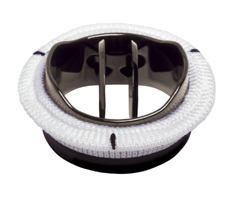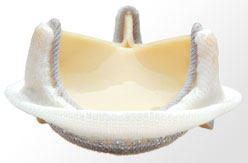Mechanical Or Bioprosthetic Heart Valve Replacements?
By Adam Pick on August 29, 2008
Earlier today, Helia wrote to me, “Adam – I have been diagnosed with severe aortic valve stenosis. My cardiologist recommends surgery within the next two months. I’m confused by everything right now. Especially, I’m confused by all the different types of valve options. Which is better for me – a mechanical or bioprosthetic heart valve replacement?”
I really feel for Helia. In fact, I feel for all patients that are going through the very, very, very, very awkward and fearful experience of being diagnosed with heart valve disease. As I remember, it’s not fun. Still, I’m not going to wallow in the negative because I know that heart valve surgery is a medical miracle for most patients that need valve repair or valve replacement.

On-X’s Mechanical Heart Valve

As for Helia’s question of, “Should I get a mechanical or bioprosthetic heart valve replacement?”, that is a great question. As you would imagine, selecting a heart valve replacement – mechanical or bioprosthetic – is not unlike selecting anything else (a car, a home, a new computer, or even a spouse). There are trade-offs, or pros and cons, for both mechanical heart valves and bioprosthetic heart valves (including pig valve replacements or cow valve replacements).
Here are some of the key advantages and disadvantages of mechanical heart valves, as shared with me by several patients and caregivers:
- Advantage – Mechanical heart valves are very durable because they are made of strong materials like carbon, titanium, Teflon, polyester and dacron. As I’ve written, some mechanical valves are still ticking 38 years after implant. Because these valves are so durable, the patient risk for future valve replacement re-operations is decreased.
- Disadvantage – To prevent a risk of blood clots forming on the valve, blood thinners are used by patients for the balance of their lives. The anticoagulant, Coumadin, is the most common drug therapy used by mechanical valve replacement patients. Some patients have no issues with the ongoing monitoring (prothrombin time level) and consumption of Coumadin. Others, feel that there are some risks associated with Coumadin. (Please note that some mechanical valves – specifically the On-X Mechanical Heart Valve Replacement – are being tested for lower Coumadin intake post-implant.
- Disadvantage – Mechanical heart valve replacements are known to loud and noisy in some patients. That means the patient, and the people around them, can hear a “clicking” noise as the valve opens-and-closes in the heart.
As for bioprosthetic heart valve replacements, here are some of the key advantages and disadvantages:
- Advantage – The patient is not required to use Coumadin after surgery.
- Advantage – The valves do not click, therefore patients can not hear them.
- Disadvantage – The bioprosthetic valves are made from a pig’s heart valve and a cow’s heart tissue. That said, the bioposthetic valve are not as durable as mechanical valves. Pig valves last between 10-15 years while cow valves can last beyond 20 years in some cases. That means a young patient receiving a bioprosthetic valve may require another operation later in life.
The information shared above is not exhaustive for why a patient might select a mechanical or bioprosthetic heart valve replacement. It is intended to show some of the trade-offs for patients considering heart valve replacement selection. Please take the time to discuss this topic with your surgeon, cardiologist and your support group.
I hope this helped explain a little more about mechanical and bioprosthetic heart valve replacements.
Keep on tickin!
Adam
|
LAurie Collins says on January 14th, 2009 at 4:12 pm |
|
Adam, |
 |
|
Ken sihota says on January 25th, 2009 at 1:23 pm |
|
i am a truck driver. Wil i be able to drive big rigs or not? They are going to replace the valve in feb, 2009 |
 |
|
lucy says on March 24th, 2009 at 10:32 am |
|
Has anyone out there who had a pig valve implanted undergone a subsequent valve replacement surgery? If so, was it worth it the first time to get the pig valve, skip the Coumadin, and have the second operation, or would you have rather had the mechanical valve in the first place (with the Coumadin) and skipped any subsequent surgeries? |
 |
|
Joe Rychlec says on April 27th, 2009 at 9:55 am |
|
Hi Lucy, I made the decision to have a pig (aortic) valve put in in 1987 (I was 48) and I was coumadin-free and able to do everything I wanted to do for 18+ years, when the valve started to go. In 2005, I had the aortic valve replaced with a calf valve (while they were there, they also replaced the mitral valve, which was wearing out, with a calf valve) — Cleveland Clinic rocks!!!. Because I developed a case of atrial fibrillation, which couldn’t be eliminated, I have had to be on coumadin for the past 3 years. It’s not as annoying as I thought it might be, going for regular pro-time checks. If I had to do it all over again, I’d do it exactly the same way. Hope this helps you make your decision. Good luck! -joe- |
 |
|
Bill says on April 27th, 2009 at 7:27 pm |
|
Your information, Adam has always been of great help to us all, and your comparison of tissue vs. mechanical valves is right on target. I opted for the tissue (bovine) valve and have not regretted it. I hope it lasts me 20 years before I need further treatment or surgery. Keep up your good work and support for us all ….we appreciate all that you do. |
 |
|
Roger Graham says on May 28th, 2009 at 4:35 am |
|
Mechanical valve verses bioprosthetic valve. My cardiologist and surgeon explained it this way “A preserved animal valve will last around 15 years which means that at 61 years old you will be 76 years old. You may not want to go through open heart surgery again or you may not be well enough for us to perform the surgery. On the other hand a mechanical aortic valve will see you out but on the downside you have to take warfrin religiously every day for the rest of your life.” I wasn’t too keen on taking “rat poison” but as my good wife rightly said, “Aliitle price to pay. Get over it!” The surgery was a breeze even though my surgeon said, “I would feel like I was it by a Mac truck.” Both choices have their fores and against – be guided by your professional medical teams advice. After all they are offer you life!!! |
 |
|
peter k says on July 2nd, 2009 at 3:39 am |
|
I was just told I need a double bi-pass and a new heart valve. I am 60years old and have my own handyman business… which means I tend to have minor cuts all the time. I am concerned that if I choose a mechanical heart I would then be on coumadin. Should this be a concern? Thanks for the input |
 |
|
Tony O. Montreal says on August 9th, 2009 at 4:58 pm |
|
mecanical heart valve since 1995 implanted at the same time as I had a single coronary by-pass. On Coumadin with regular anticoagulation checkups every 6-8 weeks. I am 64, male. I have a couple of episodes of bleeding, one of which possibly led to a stroke which affects ny right side. i |
 |
|
Dr Sameer Bhate says on October 28th, 2009 at 1:59 am |
|
I am a heart surgeon.To answer helia’s dilemma ..I would choose a Bioprosthetic valve,reason being I will have to put my patient on low dose anicoagulation,they can have a very normal life style,can plan pregnancy,without the risk of discontinuing warfarin and starting on heparin. |
 |
|
Audrey Elizabeth says on January 17th, 2010 at 3:19 pm |
|
I had asked for a tissue valve three years ago – the surgeon put in a mechanical valve against my expressed wishes and I have had problems with INR levels ever since. I am sensitive to most medications, including warfarin, but have no choice. I tried low molecular weight heparin for a few months with no lasting improvement in symptoms. Furthermore, being a vegetarian who can no longer enjoy the Vitamin K enriched foods I used to be able to eat freely, it is very difficult for me to control my weight. And no, increasing my warfarin intake does me more harm than good – my INR stayed low for weeks when I upped my intake and ate leafy green vegetables. I was at 9 mg daily a year ago, (when I was 40 pounds heavier) and now am up to 12, without being able to eat salad daily as I used to. I have a resistance to warfarin. It took a month for my INR to go up to normal after being off warfarin for 6 days prior to my angiogram this past October. To add to that, after three years of begging for answers as to why I never felt better after my operation and why I have no stamina, it seems likely that I have severe patient prosthesis mismatch. My surgeon did not even discuss this possibility with me before or after my operation when I asked why I felt worse instead of better. Cardiologists told me my valve sounded just fine. The attitude was that I had my operation, so I had no reason to complain. I was also born with an interarterial left main artery, and this was re-implanted during open-heart surgery. No one was interested in doing an angiogram to review the results of re-implantation. I had to go out of province a year ago to get a CT angiogram which showed a severe kink in that artery and I was told I needed immediate surgery to bypass it. I could not face another surgery – I then met with another heart surgeon in Winnipeg who insisted on a conventional angiogram. Tests showed my blood flow to be above .8 so he told me I didn’t need another operation to bypass the kinked artery, but suggested I should lose weight because my valve is too small for my body size. I thought he was being patronizing as I had already lost a significant amount of weight (I gained 80 since the operation and have lost 40 to date) with no improvement in my symptoms of chest discomfort and extreme fatigue. Just a few days ago, I saw a new cardiologist who told me to look up “patient prosthesis mismatch” on the internet. I did and found that this is a very real condition that was named in 1978, but in 2007, my surgeon did not do his homework. I am a tall woman, 5′ 10″ with a very large bone structure. The cardiologist told me that even though I should lose the extra weight and more, I will still have severe patient prosthesis mismatch. The surgeon who told me to lose the weight seemed to think that is all that I need to do to feel better. I would not have gained that much weight if I had been able to be physically active as I expected to be. I gained 30 pounds in two months a few months after my operation, in spite of trying to be more active. If I had it to do over again, I would have taken my chances with my original valve. My life is worse, not better. There seem to be a lot of studies discussing “survival” rates from a medical point of view, but very few that I’ve seen discussing quality of life in relatively younger patients. The ones I did read say that patients with a large body size younger than 60/65 should never be given a valve too small for their relative body size because it increases the likelihood of ‘cardiac events’. I was 53 when I had the operation, and it seems the surgeon should have enlarged my aortic root rather than put in a valve that can’t support my size. I didn’t know this condition existed. Since my operation, I have had several episodes of severe chest discomfort, and it seems this will get worse instead of better. Please do your own homework before having open-heart surgery. I wish I had. |
 |
|
donna coogan says on March 11th, 2010 at 2:01 pm |
|
i am 52 ,living in Ireland,have to have aortic valve replacement and am trying to decide on which valve .at the moment i am thinking of getting the pig valve and would like to hear more stories about people that had to have a second replacement,what it was like,hown long first valve lasted and what choice they made the second time..i also have a pacemaker which was fitted 7 years ago for complele heart block .I do not know yet if a bovine valve is available here ? |
 |
|
Deborah Dasilva says on March 12th, 2010 at 9:02 am |
|
Hi my son is 17 and needs a valve replacement ,I think we are going to have the pig tissue , I feel he is to young to start being on blood thinners .Iam hoping this is a right way to go . we feel if it has to be replaced later in life than we will deal with it then ,at least if it needs to be repaired they can ,mechanical your stuck with it ,we are scared for our son , he wants to get back to sports and will not be good at taking his meds being 17 and wanting to go to college . |
 |
|
kimberly says on March 12th, 2010 at 8:14 pm |
|
I am scheduled to have AVR in about 3 weeks. Deciding between the biological valve and the mechanical valve has been a real adventure in prayer and research. I have gone back and forth a few times, but have decided to go the biological route. When I asked my surgeon what his choice would be, if he were having this operation, he said he’d go mechanical. However, he also said his partner IS having Aortic Valve Replacement, is my age (50) and has opted for the bulls heart valve. That being said, I researched some more, talked with people who had replacements and made my decision. I figure that with the blood issues, the coumadin, the easy bruising and bleeding, the monthly lab work and the possibilties of mechanical failure, as well as the tweeking that would be involved with any future surgeries for other conditions (all possible as we age) that the biological valve made more sense for me. I am still a young 50 years old. I lift weights, ride my bike, and participate in sports, all of which would change some – at least the intensity level- if I had to take coumadin. I have a horse that I enjoy riding, 2 labs and a Great Dane, all of who accidentley bump me from time to time when the are greeting me. Not good if you’re taking coumadin. By the time I need to think about replacing the bio valve (12-15 years), if my life style has changed then I can always get the mechanical valve then. Who knows what strides will be made in medicine in the next decade. Maybe, then, the surgery that is being performed on patients needing AVR (valve is placed through the Femal Artery, in the leg) but are too weak for surgery will be perfected and common. Even today, we don’t always need the 8 inch sternum break but can often elect the 3 inch mini operation. Bottom line, I’m getting the biological bulls valve. |
 |
|
Meigs says on March 12th, 2010 at 8:36 pm |
|
Deborah, |
 |
|
vikki wood says on October 24th, 2010 at 5:04 pm |
|
hi there! |
 |
|
belle says on March 24th, 2011 at 7:14 am |
|
can you gave me an advice…? i have a mitral valve stenosis and what is the longest spand of time and year of the bioprosthetic valve. i and whats the difference between the pig and cows valve and does cow valve tissue available in the Philippines? pleas help me im so scared and confused…and by the way ive been taking lanoxin and coumadine.. by the way i am 27 years of age and i want the cows valve …coz i want to have kids..and does cows valve fit for my age? |
 |
|
wendy suchinski says on June 19th, 2011 at 1:53 pm |
|
I was diagosed with bicuspid valve am 51 and am going for aortic valve replacement in July. I was also born with 1 kidney and now think maybe my recent rise in creatine to to stenosis. I am torn between which valve to choose. Cardiologist pro mechanical and surgeon pro tissue. Does anyone know if and how coumadin affects the kidney? I really need to protect the one kidney I have. |
 |
|
Maychel says on September 2nd, 2011 at 7:05 am |
|
Hi, I would actually like to know what kind of operation my brother may need. I’ve been asking some doctor in my country but unfortunately they are not so certain to let me know what operation he needs. My brother was diagnosed with a Rheumatic Heart Disease & Chronic obstructive Pulmonary Disease. I wonder if you could help me which kid of action we may need so we could organize ourselves as well for the necessary arrangements may required. Hoping your prompt reply. |
 |
|
belle says on October 3rd, 2011 at 6:31 am |
|
can you gave me an advice…? i have a mitral valve stenosis and what is the longest spand of time and year of the bioprosthetic valve. i and whats the difference between the pig and cows valve and does cow valve tissue available in the Philippines? pleas help me im so scared and confused…and by the way ive been taking lanoxin and coumadine.. by the way i am 27 years of age and i want the cows valve …coz i want to have kids..and does cows valve fit for my age? |
 |
|
Renzo says on February 27th, 2012 at 2:51 am |
|
I was born with a bi-cuspid aortic valve that worked fine until I contracted a blood infection that attacked my valve. I under went a ross procedure in 1998 when I was 19, where they replaced my aortic valve with my pulmonary valve and replaced the pulmonary with a donor. 10 years later they found that I had a upper aortic anuerism that was a direct effect from my pervious surgery. So I went back in to have that fixed. They replaced the lower aortic root and spared my valve in the process. Now at 33 with two young kids, I need to have another valve replacement. I went to three different surgeons and received three different opinions. One said I should get the mechanical, one is pushing for a pig valve, and the other a cow’s. I’m going with the Cow’s Valve. I’m also having my upper aortic root replaced, this is to prevent another anuerism. My advice to anyone who gets an aortic valve replaced. Make sure you research your surgeon. Its easy now days just google them. The surgeon should be an expert at the exact surgery that you are having. Make sure the aortic root is replaced with the valve. There is a good chance that you can develop an anuerism if that is not done. They are not easy to diagnose and sometimes not known that it has developed until it is too late. |
 |
|
Shayma says on September 3rd, 2012 at 9:20 am |
|
Im 16 years old and I was born with Aortic Stenosis, I would go with the pig/cow one for sure just because with the metal one you cant have kids :/ also because when the pig/cow one starts to fail you get a warning when the metal one fails you could just drop dead. Its alot safer to go with the pig/cow one but you should always look into both options AND your surgeon. Google your surgeon and see if hes good at what he does. Im looking at surgery this February of 2012, I am going with the Cow valve |
 |
|
Michael says on December 15th, 2012 at 9:33 pm |
|
Hello |
 |
|
Michael says on December 15th, 2012 at 9:39 pm |
|
By the way, just to add, my heart injuries were due to a bicuspid valve, not being active. I am currently undergoing genetic testing for a soft tissue disorder too since I once suffered a spontaneous pneumothorax about a decade ago. |
 |
|
Wade says on December 20th, 2012 at 4:04 pm |
|
Michael – we have a lot of similarities! I was 27 (4-yrs ago) when I had an aortic mechanical valve replacement (St Jude as well). I didn’t really have any symptoms (I had run the marathon ~6-months prior, and done the MS150 bike ride ~3-months prior) so I was very fortunate that my PCP diagnosed my aortic regurgitation during a routine physical and had me do some follow-up tests…. Since my surgery, I have run 2 full marathons and several half marathons (the first of which was ~5-months post surgery). I don’t do much of the speed work or hill work so that my heart rate stays at a reasonable level, but I am still able to keep up (though I am certainly not breaking your 3-hr mark! 3:35 is my post-surgery PR). All in all, I really don’t feel restricted by the surgery – I have still gone snow/water skiing and other similar activities, I just tone down the intensity to keep me upright 🙂 I do have to take Coumadin, but I have gotten used to that and have been fortunate that my levels have remained pretty consistent. From time to time, I do have random bruises show up as I still run into the occasional table, but I wouldn’t consider it major bruising and I haven’t had issues with blood levels as a result. I also have a home testing device that makes it very convenient to check my INR (I strongly recommend this if you can get your insurance to help cover the cost). Also, as far as the clicking goes – I don’t even realize it anymore. Maybe on occasion in a quiet bathroom where everything echoes, but otherwise it has just become “regular” to me so I drown it out. Everybody’s situation is different basis their age, lifestyle, gender, etc., but I have no regrets going with the mechanical valve. |
 |
|
rondingo says on March 23rd, 2016 at 7:42 pm |
|
Wow after reading all of your responses, I wished I had this knowledge before. Its now March 2016. I was told I had mitral stenosis in 2010. The cardiologist said it wasn’t serious in 2013 I ended up needing my gall bladder and gall stones removed. long story short I was prepped and ready for the surgery. Different hospital the surgeon noticed my heart rate was in tachycardia state. She asked if I was nervous. I was not. then she ordered an ekg, which ended up in cardio echogram. they took me back to my room. Then several doctors came in stating I was in need of emergency heart surgery. They gave me a St. Jude’s one, Mechanical. I hear it beat crazy sometimes which makes me feel nausea. Yes at times it is very loud. and times I forget its there. I had no time to research. I’m still learning |
 |
|
Julie A Guillaumin says on January 26th, 2017 at 4:42 pm |
|
I’m up for AVR soon ( my stenosis is critical) and have put off surgery because I can’t decide on a valve. I am 43, so of course mechanical would make sense. But I have PMDD, and very bad monthly cycles, and also intolerant to many medications. I am very afraid of Coumadin, but don’t know if my fears are rational. On my last visit, my surgeon told me that he thought a tissue valve would last me 15 years. I know there’s no way to know this. If that’s true, he said I could do TAVR at age 58, and those valves may last longer then. I am not sure how long the valves they use with the TAVR procedure last now. My anxiety level is through the roof, and can’t sleep at night for fear of making the wrong choice. Any advice? |
 |
|
Sandra Gibbs-Humes says on January 29th, 2017 at 10:01 am |
|
My husband had valve replacement in 2009. He chose tissue valve(cow). He was taking 325mg aspirin. His Dr. has recently prescribed warfarin instead of aspirin. He also has Afib which he had many years before his surgery. He chose the tissue valve(cow) due to the fact that he would not have to take Coumadin. Should he question this change or is this normal? |
 |












